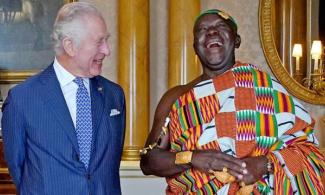
According to BBC, the three-year loan agreements, with an option to extend for a further three years, are not with the Ghanaian government but with Otumfo Osei Tutu II - the current Asante king known as the Asantehene - who attended the coronation of King Charles last year.
The United Kingdom will loan back Ghana’s “Crown Jewels” 150 years after looting them from the court of the Asante king.
According to BBC, the three-year loan agreements, with an option to extend for a further three years, are not with the Ghanaian government but with Otumfo Osei Tutu II - the current Asante king known as the Asantehene - who attended the coronation of King Charles last year.
A gold peace pipe is among 32 items returning under long-term loan deals.
The Victoria & Albert Museum (V&A) is lending 17 pieces and 15 are from the British Museum.
Ghana's chief negotiator said he hoped for "a new sense of cultural cooperation" after generations of anger.
Some national museums in the UK - including the V&A and the British Museum - are banned by law from permanently giving back contested items in their collections, and loan deals such as this are seen as a way to allow objects to return to their countries of origin.
But some countries laying claim to disputed artefacts fear that loans may be used to imply they accept the UK's ownership.
Tristram Hunt, director of the V&A, told the BBC that the gold items of court regalia are the equivalent of "our Crown Jewels".
The items to be loaned, most of which were taken during 19th-Century wars between the British and the Asante, include a sword of state and gold badges worn by officials charged with cleansing the soul of the king.
Hunt said when museums hold "objects with origins in war and looting in military campaigns, we have a responsibility to the countries of origin to think about how we can share those more fairly today.
"It doesn't seem to me that all of our museums will fall down if we build up this kind of partnerships and exchanges."
However, Hunt insisted the new cultural partnership "is not restitution by the back door" - meaning it is not a way to return permanent ownership back to Ghana.
The Asantehene still holds an influential ceremonial role, although his kingdom is now part of Ghana's modern democracy.
The items will go on display at the Manhyia Palace Museum in Kumasi, the capital of the Asante region, to celebrate the Asantehene's silver jubilee.
The Asante gold artefacts are the ultimate symbol of the Asante royal government and are believed to be invested with the spirits of former Asante kings.
They have an importance to Ghana comparable to the Benin Bronzes - thousands of sculptures and plaques looted by Britain from the palace of the Kingdom of Benin, in modern-day southern Nigeria. Nigeria has been calling for their return for decades
Nana Oforiatta Ayim, special adviser to Ghana's culture minister, told the BBC: "They're not just objects, they have spiritual importance as well. They are part of the soul of the nation. It's pieces of ourselves returning."
She said the loan was "a good starting point" on the anniversary of the looting and "a sign of some kind of healing and commemoration for the violence that happened".
UK museums hold many more items taken from Ghana, including a gold trophy head that is among the most famous pieces of Asante regalia.
Most of the items the V&A is returning were bought at an auction on 18 April 1874 at Garrards, the London jewellers who maintain the UK's Crown Jewels.
They include three heavy cast-gold items known as soul washers' badges (Akrafokonmu), which were worn around the necks of high-ranking officials at court who were responsible for cleansing the soul of the king.
Angus Patterson, a senior curator at the V&A, said taking these items in the 19th Century "was not simply about acquiring wealth, although that is a part of it. It's also about removing the symbols of government or the symbols of authority. It's a very political act".
The British Museum is also returning on loan a total of 15 items, some of them looted during a later conflict in 1895-96, including a sword of state known as the Mpomponsuo.
https://www.bbc.com/news/